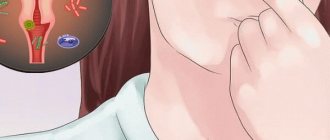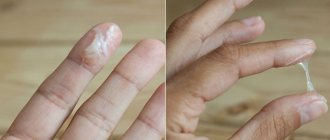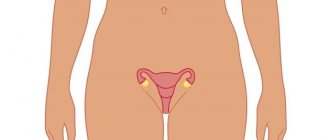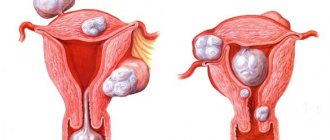Vaginal discharge is a physiologically normal phenomenon for every woman. It is important to be able to distinguish a healthy state of the body from deviations. Often, a sour odor from the intimate area indicates certain diseases and changes in the composition of the vaginal microflora.
Sometimes changes in the smell and consistency of discharge are observed due to changes in hormonal levels. There are characteristic symptoms for each of the causes that will help eliminate the discomfort that appears.
Description and characteristics
Pathologies of the genitourinary organs can be provoked by environmental or internal factors (failure of hormonal balance, immune system, metabolic processes).
If the discharge smells like onions, it suggests the presence of ailments such as vaginosis and candidiasis of bacterial origin.
The cause of a specific aroma in the intimate area is determined as a result of a thorough diagnosis, which consists of:
- from examination by a female doctor;
- taking smears;
- Ultrasound of the pelvic organs;
- urine and blood biochemistry tests.
A pungent vaginal odor is not necessarily a consequence of the disease; it also appears due to physiological processes:
- pregnancy;
- breastfeeding;
- menstrual phases;
- the beginning of sexual relations.
The structure and smell of the mucous substance from the vagina are greatly influenced by hormonal levels. Estrogen and progesterone play a major role in the functioning of the fertilization system. The imbalance that arises between them can be the cause of an annoying aroma that can appear upon the onset of ovulation, in the first weeks of an interesting position (when the woman does not yet know about it), and with prolonged use of contraceptives.
Vaginal secretions are usually clear and scanty. With the onset of ovulation, it thickens and becomes more abundant, and in the end, the body begins to more actively produce progesterone, due to which in the next phase of the cycle the discharge becomes whitish and smells sour or garlicky. Pregnancy and contraceptive use show a similar picture. This should not be confusing, as it is the norm.
Symptoms of abnormalities should cause alarm: unpleasant feelings in the lower part of the body, pain and accelerated urination, itching of the vulva.
Norm
After the baby is born, the final stage of childbirth begins - the passing of the placenta. In its place a large wound surface forms. It is from this area that the bleeding begins. This process is normal and usually does not require medical intervention. An important condition is a small loss of blood, as well as the normal state of health of the woman in labor.
Subsequently, the discharge becomes less abundant. They last from 4 to 8 weeks. At first, the lochia has a rich red tint, later turning brown. By the end of the second month, a woman may detect only minor bloody discharge.
Causes of odor
If your vagina smells like onions, you may have an infection in a sensitive area or the onset of a sexually transmitted disease:
- An infection caused by the fungus Candida albicans (thrush).
- Gardnerellosis (bacterial vaginosis).
- Colpitis (inflammation of the vaginal mucosa).
- Trichomoniasis, syphilis, gonorrhea, inguinal lymphogranulomatosis, venereal granuloma.
- Pathologies in the uterus and appendages.
With thrush, women's discharge may have a specific smell, so we recommend reading a separate article on this topic.
Other factors can provoke vaginal secretions with a characteristic odor:
- treatment of another disease not related to the sexual sphere with potent antibiotics;
- hypothermia or overheating of the body;
- some hygiene products that disrupt the acid-base balance in the vagina;
- depressive and stressful conditions.
Urogenital form of candidiasis
Among the pathological ailments characterized by discharge with the smell of onions, candidiasis is noted, which is provoked by fungi that have entered the female organs. They cause an unpleasant aroma, then the appearance of a cheesy discharge that becomes more and more abundant, increased itching in the genitals, a feeling of tightness and dryness of the skin, a burning sensation and pain during urination and sexual intercourse.
Vaginal inflammation and swelling of the labia lead to the formation of a whitish coating on their surface (hence the name “thrush”).
The disease occurs when the body’s immune defense decreases, self-medication with antibiotics (without taking antifungal agents) that destroy microflora, changes in hormonal levels (pregnancy, menopause, taking hormones, beginning of sexual relations). After an abortion, candidiasis is also possible.
In addition, thrush can be caused by wearing tight underwear made of unnatural materials and neglecting personal hygiene. An untreated disease will become a serious threat to the health of the female reproductive system as a whole.
Bacterial vaginosis
During reproductive age, women can catch an unpleasant disease - gardnerellosis. The color and smell of pathological discharge in this case are due to the active activity of microorganisms such as staphylococci, streptococci and E. coli. As they multiply, they cause the appearance of an onion smell mixed with rotten fish, which usually occurs before the onset of menstruation.
Among the factors for the formation of vaginosis are:
- using a condom treated with nonoxynol-9;
- irrigation with chamomile decoction;
- change of partner;
- taking antibiotics to recover from other diseases.
Advanced gardnerellosis causes the development of inflammatory processes in the uterus and appendages, and in a pregnant woman – early labor and its complications.
Colpitis
The mistake of many representatives of the fairer sex is that they associate inflammation of the mucous surfaces of the vagina, accompanied by nagging pain and heaviness in the abdomen, with hypothermia.
However, the origin of these symptoms is of an infectious nature: entry into the vagina of trichomonas, candida fungi, herpes virus, cytomegalovirus, mycoplasma, E. coli and other opportunistic pathogens. As a result, colpitis develops, which can be diagnosed based on the following symptoms:
- copious, sometimes serous, purulent discharge;
- feeling of heaviness in the vagina;
- burning;
- pain when urinating.
There are three stages of the disease:
- Spicy. Women complain of severe pain and a large amount of pathological discharge. An examination by a gynecologist shows the presence of redness, swelling of the mucous membrane, and possible ulcers.
- Subacute. The pain subsides a little, the discharge decreases, and the swelling subsides.
- Chronic. All signs of the disease are weakly expressed, pathological contents of a serous or purulent nature continue to be released.
Colpitis is often caused by vaginosis (thrush), which is confirmed by laboratory tests.
The doctor will definitely prescribe a microscopic examination of tests from the cervix, vagina and urethra for trichomonas, fungi, gonococci, oncocytology, and may also additionally recommend taking blood and urine tests, diagnosing STDs, and undergoing a colposcopy procedure. This will allow you to determine what is causing colpitis and prescribe adequate therapy.
Remains of placenta
An unpleasant smell of discharge a month after childbirth may be a sign of the presence of placenta residue in the uterus. However, this pathology manifests itself not only as one symptom. In most cases, the woman begins to feel very bad. She develops weakness, malaise, dizziness, abdominal pain and fever.
There can be only one treatment in this situation - curettage. The procedure is performed under anesthesia. During the manipulation, the doctor cleans out the remaining tissue and sanitizes the uterus. In particularly severe situations, complete removal of the reproductive organ is indicated. Therefore, you should not delay contacting specialists. Don’t let the situation lead to a disastrous outcome, take care of yourself.
Pathological features
It happens that the characteristic smell of onions appears in a woman after her period. If she is not sexually active, then the presence of genital infections should be excluded. Before the start of the menstrual cycle and after menstruation, increased secretion is possible, as well as the proliferation of pathogenic bacteria, which lead to the process of inflammation.
Changes in the microflora of the vagina can occur during pregnancy, as well as when using oral pills, when dysbiosis of the vaginal cavity occurs, that is, the balance between beneficial and pathogenic bacteria is disturbed.
In chronic forms of diseases, there are periods of exacerbation, manifested by increased symptoms, heavy discharge, and pain. Treatment is aimed at the complete recovery of the woman, and if she has a sexual partner, then both.
If you let the disease take its course, the development of pathologies will not be long in coming. Possible damage to the female organs of the genitourinary system, rectum, and oncological tumors.
Poor hygiene
If discharge with an unpleasant odor appears after childbirth, then perhaps the woman does not pay enough attention to her hygiene. A new mother needs to wash herself after every trip to the toilet. Use gentle intimate hygiene products or baby soap. If you have stitches on the perineum, it is very important to use antiseptics. Otherwise, an infection may occur.
Instead of sanitary pads, doctors advise using disposable diapers. They need to be changed as often as possible. Remember that after childbirth it is not enough for a woman to wash her perineum once a day.
During pregnancy
During pregnancy, an onion smell may indicate medical problems. When immunity is weakened, pathogenic flora is activated, causing inflammation and a nasty odor.
Sometimes this indicates the manifestation of a sexually transmitted or chronic disease, which the woman did not suspect, dangerous for both the expectant mother and her baby.
Comprehensive diagnostics will allow you to assess the degree of risk and improve women’s health without harming the baby.
Summarize
If after childbirth you suddenly have discharge that has an unpleasant odor, you should urgently contact a gynecologist. Many women try to cope with this symptom on their own by douching. However, by doing so you are making it even worse for yourself. After all, during douching, the infection can spread to the fallopian tubes, and subsequently to the ovaries.
Doctors also do not advise taking antibacterial drugs on your own. After all, bacteria are not always the cause of symptoms. Only a specialist can determine why exactly the unpleasant smell of discharge bothers you. All the best to you and a speedy recovery!
Every postpartum woman (whether natural childbirth or cesarean section) experiences vaginal discharge that lasts approximately 6-8 weeks. During this period, the discharge may change color, thickness and smell, as it consists of blood cells, plasma and dying uterine epithelium. However, sometimes the discharge has an unpleasant odor, which may indicate a serious danger to the woman’s health.
Diagnosis and treatment
If a woman feels an onion odor from her vagina, the first thing she should do is consult a specialist. The examination scheme is as follows:
- Collecting anamnesis (lifestyle, risk factors, previous diseases, complaints). Diagnosis and treatment largely depend on the correct answers.
- Gynecological and bimanual examination. Using these procedures, the physician determines the condition of the mucous membrane, palpates the uterus and appendages, and examines the discharge.
- Taking samples for bacterioscopy. If there is a pathology in the smear, it means there is an inflammatory process.
Medicines are prescribed depending on the diagnosis. In any case, complex therapy will be required. It includes bacterial drugs, antifungal and anti-inflammatory substances.
To restore hormonal balance, hormone therapy is used, which gives good results: menstrual irregularities and other symptoms disappear.
Treatment for a simple imbalance that does not require drug intervention may involve the use of folk remedies - phytohormones and phytoestrogens produced by certain types of plants.
Impaired blood flow
If there is a very small amount of discharge with an unpleasant odor for a month after birth, then the reason for this may be some kind of obstacle. Sometimes it happens that the uterus stops contracting for some reason. This pathology is often encountered by women who do not breastfeed. Also, the cause of blood retention can be congenital and acquired malformations of the reproductive organ, for example, the presence of a septum.
Often, mothers in labor after a cesarean section experience impaired blood flow, because the tissue in the scar area cannot contract fully. Such women are required to take oxytocin-based medications.
Preventive actions
To prevent the occurrence of pathologies that cause onion odor, personal hygiene products should not be neglected. To prevent dysbiosis and infection, it is necessary to eat natural foods rich in microelements and vitamins. The amount of proteins, fats and carbohydrates should be balanced. You need to drink kefir and other lactic acid products that restore the balance between beneficial and harmful bacteria.
A healthy lifestyle - giving up smoking, alcohol and other bad habits, hardening, swimming, massage, playing sports in the fresh air - will help prevent the disease.
What is considered normal discharge?
But especially important changes at this time occur in the uterus, which begin immediately after the placenta is separated from its inner surface (regardless of how the child was born - by cesarean section or through the natural birth canal). The uterus begins to contract, shrink to its normal state. The separation of the placenta is accompanied by a kind of trauma to the inner surface of the uterus, so for 2-3 days it is accompanied by fairly strong bloody discharge, called lochia.
Over time, lochia, which does not have a distinct odor or smells like normal menstrual discharge, changes its intensity, consistency and color, and this should be paid attention to (even if the discharge is not particularly bothersome). On days 6-7 after birth, lochia becomes less abundant and acquires a brown tint, but it can become a little more intense if a woman is breastfeeding or has physical activity. They may also intensify when coughing or laughing, but this is a normal manifestation of more active contraction of the muscles of the abdominal cavity, and with them the uterus.
Discharge is considered normal if it is not accompanied by unpleasant sensations such as irritation, itching, does not have an unpleasant odor, and has completely stopped 45-60 days after birth.
As soon as the discharge has stopped (before or after the specified time), women are recommended to undergo a gynecological examination so that the doctor can assess the condition of the uterus, its cervix, vagina and sutures.
Possible consequences
Any disease in the postpartum period, accompanied by discharge with an unpleasant odor, can lead to serious consequences. Discomfort and aesthetic inconvenience are only a small part of the problems.
Vaginosis can cause infertility or negatively affect subsequent pregnancy, causing complications during delivery. The disease makes the genitourinary system weak and unable to resist infections.
Endometritis can not only cause infertility, but also cause death. Inflammatory processes can penetrate deep into the body and subsequently affect organs of other systems from the inside. As a result, the development of sepsis (a systemic inflammatory reaction in response to a local infectious process) is possible, which is often incompatible with life.
After childbirth, a woman’s life changes dramatically, and the author of the article was no exception. Lochia is a way of cleansing the body, they are an absolute noma, but only until they begin to emit an unpleasant odor. Initially, I encountered the smell of sweetness in the second week after giving birth. It did not cause severe discomfort, there were no other alarming symptoms, but still I decided to call my gynecologist and report this fact. The doctor advised me to make a decoction of chamomile and wash the perineum with it at least three times a day. I strictly followed the doctor's orders. After a few days the smell stopped bothering me. At week 7, the discharge began to emit a sour smell. At the same time, problems with lactation appeared. I went to the doctor. A smear on the flora confirmed the presence of thrush, the doctor prescribed Pimafucin suppositories. Lochia at that time was no longer abundant. After therapy, the sour smell completely disappeared, and lactation was restored. I learned the following for myself: a timely visit to the doctor is the key to a successful solution to the problem and the opportunity to eliminate negative consequences. Don't be afraid to talk about your symptoms with a specialist. Even a slight deviation from the norm should cause concern and careful attention to your body.
If a foul odor appears in postpartum discharge, it is necessary to identify the cause of the pathology. You won’t be able to do this yourself at home, so you need to seek help from a specialist. A young mother must take care of her own health, because now she is responsible not only for herself, but also for the child.
After childbirth, every woman experiences bloody vaginal discharge - lochia, which becomes lighter over time. This phenomenon is considered normal. Dead epithelial cells and blood cells come out of the uterus. Sometimes discharge after childbirth acquires a persistent unpleasant odor. Can such a condition signal the presence of a pathological process and what to do if a yellow discharge with a distinct rotten odor appears?
What should be the normal discharge after childbirth?
Over the course of 1.5–2 months after childbirth, the female body gradually returns to its original state. The uterus begins to contract and decrease in size, and characteristic discharge - lochia - appears.
In the first few days after the birth of the baby, the discharge is quite copious and bloody. Then the intensity of lochia decreases, although a short-term increase is observed when sneezing, coughing or physical activity. As a rule, the discharge does not smell of anything or has a slight smell of blood - this is considered a normal natural phenomenon.
Restoring the female body after childbirth
Restoration of the uterus and its return to its original size occurs the sooner the more often the baby is latched to the breast. Feeding on demand stimulates the production of oxytocin in a woman’s body, causing the smooth muscles of the uterus to contract and quickly cleanse it. Therefore, the reproductive system as a whole in a woman who is breastfeeding is restored faster than in a woman who is not breastfeeding.
Another condition for the rapid restoration of a woman’s reproductive system is stable bowel movements; it is necessary to diversify your diet with foods containing fiber to ensure daily bowel movements.
Frequently lying on your stomach causes postpartum discharge to pass unhindered, so roll over onto your stomach more often.
The discharge may change color. If at first they were bright bloody in color, then later their color may change closer to brown. If they don't have an unpleasant odor, don't be nervous about it.
Prevention of diseases of the genital area in the postpartum period will be regular hygiene procedures. Each visit to the toilet should end with washing the perineal area with warm water and soap (preferably baby soap). If the sutures received during childbirth are still healing, after hygienic procedures you should carefully and carefully dry the area, blotting it with a soft cloth.
As long as there is postpartum discharge, you should first use special postpartum and then regular sanitary pads. Tampons should be put off until after your regular period, as they prevent the release of lochia, which can cause an infection. Throughout the postpartum period, a woman should monitor the nature of the discharge, changing pads regularly every two hours.
An unpleasant odor can serve as a signal that an infection has entered the body and an inflammatory disease is developing. This symptom, along with fever, weakness and pain, should be a reason to immediately consult a doctor to determine the cause of poor health and subsequent treatment.
During pregnancy, a woman is under the constant supervision of a doctor, who records the slightest changes in the health of the expectant mother and fetus, prescribes a course of procedures and adequate treatment. After the birth of a child, a woman devotes all her energy and time to the baby, forgetting about her ailments. And yet you should not forget about yourself, since the baby needs a healthy mother, and the spouse needs a wife. Therefore, there is no need to delay visiting a doctor if you notice any abnormalities in your body.
Every woman after childbirth comes into contact with vaginal secretions, which include plasma, dying uterine epithelium, and blood cells. This phenomenon is considered the absolute norm. The secretion can change its color, consistency, and smell. The unpleasant smell of discharge is a sign of the development of pathology. This symptom signals danger, so it should not be ignored.
What should normal postpartum discharge be like?
For the female body, childbirth is a serious test. It is natural to assume that the organs of the reproductive system need restoration. Usually 6–8 weeks are enough for them. The most significant changes occur in the uterus; they begin immediately after the placenta separates from its surface. The uterus begins active contractions in order to return to its normal size. After childbirth, the internal surface of the organ is injured, so for 2-3 days there is heavy bleeding, which gradually decreases and continues up to 8 weeks - lochia.
Heavy bleeding for 2-3 days after childbirth is the absolute norm, and scanty or excessively heavy discharge should be the reason to consult a doctor
Normal discharge does not have a strong odor or smells like blood. Subsequently, the lochia reduces its intensity and changes color to a lighter color. On the 6th–7th day after delivery, the secretion normally acquires a brown tint.
Please note: if a young mother is breastfeeding or practicing active exercise, the secretion may become more abundant. The more actively the abdominal muscles contract, the more abundant the discharge will be.
| Days after childbirth | Color of secretion |
| Two to three days | Bright red, strong, a regular gasket won't suffice |
| Until the end of the first week | Reddish-brown, dark, sometimes black |
| After the first week and up to 5–6 weeks | Brown, yellow-brown, similar to menstrual smear with clotted blood |
| 6–8 weeks | Beige, white-yellow, light, yellowish |
Discharge is normally not accompanied by discomfort in the form of itching, irritation and unpleasant odor; it becomes less pronounced over time and completely disappears on the 45th–60th day after delivery.
Important: after the lochia has stopped, the woman must undergo an examination by a gynecologist.
Prevention
Regular exercise is good for overall health
A healthy diet and regular exercise are important for maintaining overall health and vaginal health in particular.
Pelvic floor strengthening exercises (Kegel exercises) help strengthen the muscles that support the vagina. They will be of particular benefit to women who have other medical problems in this area, such as frequent urine leakage.
Using mild soaps and showers, avoiding perfumed products, and practicing good hygiene will help prevent bacterial infections.
By wearing cotton underwear you can keep your vagina clean and dry.
Healthy sex using barrier methods of contraception such as condoms will help you avoid sexually transmitted diseases (STDs). Sexually active women should be checked regularly for STDs by a doctor.
Drug therapy
To most effectively eliminate fishy odor from the intimate area, it is necessary to eliminate the cause that provokes this symptom. In order for therapeutic treatment to give a positive result, the type of pathogen that causes the pathology is first determined. If the herring aroma in women was caused by Candida fungi, then the following medications may be prescribed:
- Lomexil or Nizoral tablets;
- Iodoxide is prescribed as an antiseptic;
- the drug Fluomizin, which has an antimicrobial spectrum of action.
Treatment of thrush in men gives good results after using ointments or creams with an antifungal spectrum of action. The most effective remedy is Clotrimazole ointment, which helps eliminate a large number of varieties of fungal microorganisms, including Candida. As analogues of this drug, ointments can be used in the form of: Candizol, Kanizol, or Kanesten.
With the development of gardnerellosis, therapeutic treatment is prescribed, consisting of two stages. At the first stage of treatment, the majority of gardnerella are destroyed from the genital tract cavity, for which the use of antibiotic spectrum drugs is prescribed, the most effective of which are Metronidazole and Clandamycin, which can be used in the form of ointments, gels, vaginal suppositories or tablets. The course of treatment is at least 10 days.
After the pathogenic microorganisms are completely destroyed, the second stage of treatment begins, which consists of restoring the vaginal microflora. For this purpose, lactobacilli or bifidobacteria are prescribed in the form of vaginal suppositories, the most effective of which are considered:
- Acylact;
- Lactobacterin;
- Lactonorm.
Throughout the entire period of treatment, the diet is also adjusted, a special diet is prescribed, excluding all spicy and fried foods, alcohol-containing products and all types of sweets.
It is recommended to enrich the diet by introducing fermented milk products in the form of yogurt and kefir, which contain beneficial lactobacilli. To prevent the development of intestinal dysbiosis against the background of this pathology, women are prescribed a course of probiotics in the form of Linex, Bifidumbacterin or Enterozermin.
Every 10 days it is recommended to visit the gynecological office to monitor the therapy.
Traditional therapy
You can also use traditional medicine, the most effective of which are the following recipes:
- chamomile infusion with calendula flowers, which are used for daily washing of the genitals;
- disinfectant baths with the addition of tea tree oil, for the preparation of which you need to dissolve a couple of drops of oil in a glass of water and rinse the genital area with the resulting solution.
The use of traditional methods of treatment is allowed after preliminary consultation with the attending physician and in the absence of individual intolerance to plant components.
Recommendations from experts
To ensure that the recovery process after childbirth occurs without complications and unpleasant symptoms, experts recommend carefully monitoring your personal hygiene and not skipping routine examinations with a gynecologist. Preventive measures also include:
- Frequent visits to the toilet to empty your bladder in a timely manner. This measure will reduce the load and pressure on the uterus.
- Put the baby to the breast more often. This will allow the uterus to recover faster, since breastfeeding helps contract the uterine muscles.
- During the entire recovery period (until vaginal discharge stops), you should not visit saunas, swimming pools, baths, or take a bath. Only warm showers are allowed.
- Change pads every 2-3 hours, wash with warm water and herbs (chamomile, string, calendula). The use of tampons is prohibited, since this disrupts the natural process of leakage of lochia and creates favorable conditions for the proliferation of pathogenic microflora.
- You can start having sex only after consulting a doctor (we recommend reading: when can you start having an intimate life after giving birth?). In this case, the use of a condom is mandatory to avoid infection of the intimate area.











